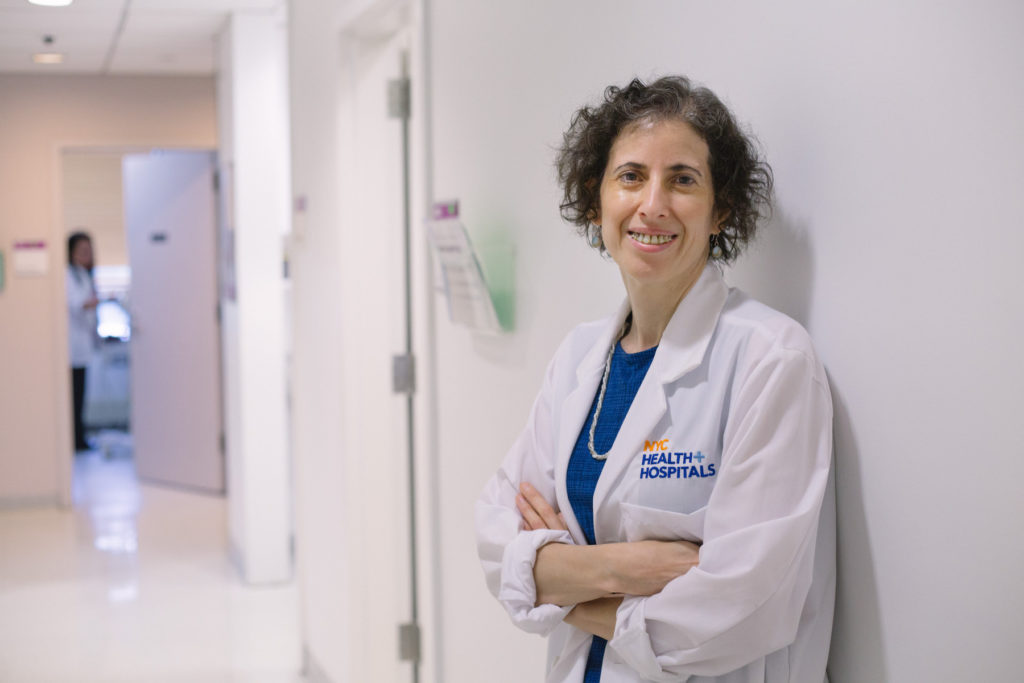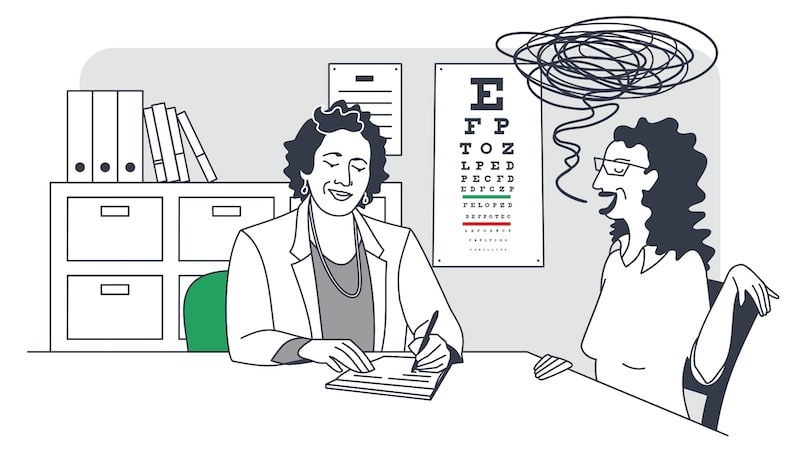Q&A with Dr. Danielle Ofri, Author of 'What Patients Say, What Doctors Hear'

Dr. Danielle Ofri is a physician at New York City’s Bellevue Hospital, the oldest public hospital in the US. She is also a faculty member of NYU School of Medicine and Editor-in-Chief of the Bellevue Literary Review – the first literary journal to arise from a medical setting. As well as caring for patients for more than two decades, Danielle has 7 books published and writes regularly on medicine and the doctor-patient connection for the New York Times and Slate Magazine. Her writing has also appeared in the Los Angeles Times, the Washington Post, the New England Journal of Medicine, the Lancet, and on CNN and NPR.
In her latest book, ‘What Patients Say, What Doctors Hear’, she explores ways to refocus conversations between doctors and their patients to encourage better health outcomes. Citing the latest studies and interviewing researchers, doctors and patients, Danielle explores the topic using deeply human stories backed by compelling evidence.
To find out more about the discoveries highlighted in the book and what motivated her to write it in the first place, I sat down with Danielle.
The following is a Q&A transcription from our discussion:
Can you give a brief rundown of your medical career for those who might not be familiar with you?
“I went to medical school at NYU and ended up doing a joint MD-PhD program because I thought I was going to be a bench scientist. Then I did a PhD in neuroscience and decided to go into neurology. But, during my one year medical internship at Bellevue Hospital in New York, I completely fell in love with general medicine and ended up training in internal medicine and then staying at Bellevue as an MD after that. So that’s the quick rundown.
By the time I finished my training, it had been 10 years of grind, so I decided to take an eighteen-month break before I started back at Bellevue as an attending physician.
When I trained at Bellevue it was the height of the ‘90s AIDS epidemic in New York. It was quite a brutal time and I had seen quite a bit of death. So I cancelled my medical journal subscriptions, and just went off on my own
I visited various small towns all across the US doing temp medical work to earn money. I would work for 4 to 6 weeks, save my money, take off for South America, then travel until the money ran out.
At some point, I would call the temp agency and say, ‘What have you got next?’ and I’d end up in a small town in Florida or rural New Mexico. I did this for about a year and a half and that’s when I started writing.
I wrote because I had all these intense stories from the AIDS time. When it was all happening during residency I kept thinking to myself I should be writing these down. But I didn’t back then because I had no time and it was a little too close to the emotional bone.
So it was during that time off, when I was working in these small towns with nothing else to do, that I would sit and recall these stories and write them down. There wasn’t any sort of plan for a book – I just needed to put them somewhere. That’s how the writing started.”
I want to talk in depth about your book, ‘What Patients Say, What Doctors Hear’, but first can you provide a brief overview of some of the other books you’ve written?
“When I finished that year and half of travelling, I fully intended to come back to Bellevue because I loved working there, but now I had this collection of real life stories and essays, so I began sending them out to literary magazines. This collection of stories ended up forming the basis of my first book, ‘Singular Intimacies – Becoming A Doctor at Bellevue’. That’s when my writing galvanised into a side career.
I also helped create a literary journal called the Bellevue Literary Review. We publish fiction and poetry as well as non-fiction about health and healing. Slowly the literary side of my career built up alongside my medical career.
I wrote two other books that were memoir-ish. One was called ‘Medicine in Translation,’ about the different cultures we see in medicine, especially in a city hospital like Bellevue. The book also dived into the year I spent in Costa Rica. I ended up having my baby there, so I had a chance to experience being a patient in a foreign country.
As I moved along in my medical career, I started becoming more interested in the “glue” that holds the scientific girders of medicine together. I was intrigued at how much emotions play a role in clinical practice. Coming from a PhD science background, it was really a revelation to see that science only gets us so far. My revelations here became the book, ‘What Doctors Feel: How Emotions Affect the Practice of Medicine ‘.
I wrote the book during a sabbatical year with my family (now three kids), which we spent in Israel. I was writing a chapter about the friendships between doctors and patients when I found an interesting blog post from a doctor in Atlanta who had written about first becoming friends with a patient.
I called her up and she told me about a very challenging patient of hers, a young woman, with all sorts of difficult to place symptoms. She was clearly sick but there was no clear diagnosis. She explained that the patient kept pushing her to do more and more aggressive treatments and that she was becoming conflicted about this.
As I read more of this doctor’s blog, I noticed comments that were posted from someone using her real name who sounded like that patient. It turned out it was indeed her. I sent her a message and she was eager to talk so I interviewed her.
She told a completely different story. It was almost like she and the doctor were in different movies altogether – despite the fact that both women were bright, thoughtful, articulate and respected one another. I was fascinated by this difference, but my editor chopped out the chapter. Still, I thought there was something worth exploring, and that’s how ‘What Patients Say, What Doctors Hear’ came to be.”
Can you provide a brief summary of what ‘What Patients Say, What Doctors Hear’ is about?
“When we think about doctor-patient communication, we often think about bedside manner. We consider good bedside manner a nice addition if we can get it, but you often hear a patient say, ‘Oh, Dr. X. He’s a great doctor, though he has a lousy bedside manner.’
It’s almost as if we believe the best doctors have the poorest bedside manner. But when I began researching this book, I realised that this stereotype isn’t true. I learnt that you can’t actually be a good doctor without sharp communication skills. If you don’t communicate well, you’ll be a poor doctor.
The doctor-patient conversation is really the most powerful tool in medicine. Every doctor will tell you, 90% of the diagnosis is made in the history. The physical, the labs, the X-rays are all secondary.
I began digging into why it is that we doctors don’t do such a great job at communicating. Patients’ number one complaint is ‘My doctor doesn’t listen to me. I can’t explain myself to my doctor. They’re not hearing what I’m saying.’
And so, I began to poke into the research in communication, and profile several case studies regarding how communication has affected patient care, for better or for worse.”
What big discoveries did you make writing the book?
“In medicine, we put the onus on the patient to do the communicating. They tell us the story, the history. And, if it doesn’t come through well, we say they’re a ‘poor historian’. I always laugh when my medical students tell me that, I think, ‘Oh, would they make a better architect or better social worker?’
We imply that the patient’s lack of understanding into their medical history, or their lack of intelligence or knowledge, is what makes the history poor. We never think about our listening skills.
I uncovered some research that looked at the effect of a listener on the storyteller. When we don’t listen well, we affect the quality of the story. This is a critical mistake because the patient’s story is the most important data for making a diagnosis. When we doctors listen distractedly, busy typing away, or juggling six things in our minds, we’re actually handicapping ourselves in terms of diagnosis.
The book I’m currently finishing is about medical error. One of the intriguing things about medical error is that some kinds of errors, like surgical errors, are relatively easy to attack because you can make a checklist for the OR. But diagnostic errors, they’re very difficult to checklist because it’s really about how we think.
In situations when our patients do worse as speakers because our listening is poor, we risk diagnostic error. It’s a medical error right in the first five minutes of the doctor-patient interaction.”
What are some of the big factors that can affect what a patient says to a doctor? How can a doctor help avoid these problems?
“First of all, it’s not an equal conversation. The scales are not balanced.
For one, the doctor has a lot of patients to see in any given day, whereas the patient has maybe waited weeks or months for this appointment. It’s their one contact with the medical professionals, so there’s already that imbalance.
The patient also doesn’t necessarily have the same medical knowledge. Plus, they are often very worried, or frightened or in pain or nauseous or have a fever. All these things add extra barriers for patients trying to make their case.
And, I think patients feel pressure to convince their doctors of the realness of their maladies, which is not really a fair pressure to put them under.
I have some patients who try to make every symptom out to be an 11 on the 1 to 10 scale as a way of trying to convince me. I try to put them at ease – let them know that I believe them, that it’s not a courtroom where they have to make their case to me. But I get the sense that many patients feel that need. Perhaps because they haven’t been taken seriously in other contexts.”
How can a doctor make a patient feel more comfortable?
“One of the classic research findings is that doctors tend to cut patients off within 8 to 10 seconds of the patient beginning to speak. When I present this data to an audience that is not medical, they’re horrified by that statistic. They say, ‘how can you doctors be so rude?’ I try to explain that we aren’t actually trying to be rude, most of us at least, but we just want to get to the answer.
So, if a patient says, ‘I have this pain in my shoulder,’ we dive right in: ‘Where does it start, where does it stop, what makes it better, what makes it worse?’ It’s not because we want to be rude, but we’re trying to find the answer. We want to solve the problem and make our patients feel better. But the patient might have had a second thing to say, like, ‘I think I might have had a stroke last week’. And, we’ll never get to that because we’re busy running down the shoulder-pain pathway.
One thing I advise doctors to do is to try not to cut the patient off at all in the first minute. Let the patient talk, and most will get everything they want to say out in that first minute.
I have often wondered what would happen if we didn’t cut patients off at all. I asked my colleagues and they have-jokingly said, ‘Oh, never do that, they’ll talk on forever.’
So, I looked into the literature and there’s exactly one study from Switzerland that analysed this, where the doctor said, ‘How can I help you?’ and then didn’t say a word until the patient came to a natural end.
This Swiss study found that on average, if not interrupted, patients talk for about 92 seconds before they come to a natural end.
Well, you know the Swiss – reserved, precise, diplomatic. What about chatty Americans? So I tried the same experiment in my clinic.
The first patient that I tried it with finished in 30 seconds, which was pretty amazing. But he was a healthy guy just here for a physical. So I tried the next patient and it took about 36 seconds. Again he was a pretty healthy guy, little back pain, shoulder pain, weekend warrior kind of patient.
The third patient was a middle-aged guy, expanding waistline, blood pressure going up a bit. Again, 42 seconds. But then came the kicker.
Josephine Gaza, which is not her real name, but she is a patient of mine. She has all sorts of aches and pains. She also has anxiety, depression and irritable bowel syndrome. She’s got an elderly mother who she’s been taking care of, a difficult son who hasn’t gotten a job and moved out, and an unsympathetic boss.
If I let a patient like Ms Gaza talk undirected, I’d be there forever. She’ll tell me about all her pains and all her mother’s pains and I’ll have to defend her mother’s doctors’ decisions on what they’re doing. We’ll be there all night! But I promised myself to let every patient talk.

So, I said, ‘Okay, Ms Gaza. How can I help you?’ She took a deep breath and said, ‘Oh, every single thing hurts, from my nose to my toes.’ And she went through the whole list – her hair is on fire, her tongue is hurting, her elbows are burning, her legs are swollen.
On and on we went. 27 hours went by and she finally came to an end. But when I peeked at my watch, it was actually only 4 minutes and 10 seconds. It may have felt like 27 hours, but it actually wasn’t.
When she finished, I looked at the list I’d been keeping while she spoke. It was a long list, but it was finite. It didn’t actually go on forever. And once we had a list, we could make a plan. It wasn’t so hard to say, ‘These three things we’ll work on today, these 15 we’ll do in upcoming meetings. These ones will be helped by physical therapy, and those ones, perhaps your mother can see a social worker.’ It made it a lot easier.
And then something happened that I’d read about but never actually had a patient say to me up until then. Ms Gaza said, ‘You know, talking about all this has made me feel a lot better.’
In that moment, I realised that just by letting her talk, her adrenaline and cortisol levels probably went down and she felt more relaxed. In the end, she felt better. And making our patients feel better, of course, is the name of the game.
You mention in your book that the first conversation between a doctor and a patient is often the most important because trust is being built. What advice do you have for doctors when working with patients on the first visit, aside from giving them an opportunity to tell their story?
“First, the doctor must show respect. I know that sounds obvious, but patients are often disrespected by many other facets of the medical system. Perhaps the front desk didn’t treat them well, or they’re having insurance or payment problems. For many, getting medical care is a very arduos process these days.
So I try to start by being very respectful. ‘I see you’ve waited a long time’ or ‘I’m so sorry you had to wait’ or ‘I’m so glad you’re here now and we have some time.’ Small things like that go a long way.
And, when I finish the initial part of the history, I always try to say, ‘Is there anything else that I have missed?’ or maybe ‘Is there anything else you needed to tell me?’
A lot of doctors hate to ask these questions because they worry that another can of worms is being opened up. Almost always, though, the patient doesn’t have much more to add. But the fact that you asked – that shows a lot and goes a long way.
I also try to take a little bit of time to get to know who the patient is: where they’re from, how they got to this country if they’re an immigrant, who’s in their family, who they live with, what they do. A few things to find out what’s important to them, and I write them down.
Often, these facts are medically important to know. If someone’s homeless, for example, you can’t give them any home address changes to do. Or if someone was recently fired from their job, then medications you’ve prescribed may not be affordable. But there is also the human side of learning who the patient is so you’re better able to help them.
If there’s an ill parent or an ill child in the patient’s life – that’s the the most important thing for the patient. It’s usually even more important than their own hypertension.
The whole idea of being curious and wanting to know who they are – in a respectful manner – goes a long way to making the connection.
And, sometimes I’ll have to say, ‘You know, I wish we had a full hour to talk, but unfortunately, we don’t. So we have to close now, but I’m looking forward to when you come back so can work on this more.’”
There’s a fine line between developing a healthy relationship with the patient and not getting too personal. What advice do you have for doctors in this respect?
“In a typical busy day, we usually don’t have enough time to get too personal. But you can gauge your patient’s response. If a patient flinches at questions on more personal topics, then be respectful and move to another topic.
Or you can ask something like, ‘Are there any concerns in your family these days?’ A patient may say no, but you’ll get a definite message from their reaction. It’s important to keep your radar up for what seems sensitive and certainly back off when necessary.
Another strategy is to give options. I might say, ‘We generally ask patients about their sexuality and sexual partners. Would you be comfortable talking about that with me?’ If the patient isn’t comfortable, just move on.
There are also ways to frame questions that can be less invasive and feel less threatening to patients. Instead of saying, ‘Do you do drugs?’ you might ask, ‘Have you ever done any drugs in the past?’
Do you think a GP sharing personal information helps or harms the doctor-patient relationship?
“In general, the research suggests that patients like to know a little personal information about their doctor, but if there’s too much info shared, it pulls the spotlight away from the patient, which is where it belongs.
If a patient asks a personal question, I might ask, ‘What makes you curious about that?’ If it’s a mild, general question, I might answer it, but if I sense they are turning the table to try to avoid a difficult issue of theirs, I would steer the conversation back to them.
I keep a few personal things in the room such as my kids’ drawings so it feels a little bit warmer. I try to keep it friendly and share a little, but not too much, because it’s not productive for the patient when the conversation becomes too much about you.
In your book you talk about how things happening in a patient’s personal life can often be a leading cause of their health issues. If a doctor suspects this to be the case, what advice do you have for them to help make the patient feel comfortable disclosing uncomfortable aspects of their life?
“There are many things that patients may not be comfortable talking about – sexual abuse, domestic violence, eating disorders, sexual complaints. I try my best to normalise things. I might make a statement like, ‘Many people have experienced violence at home at times in their life. Have you ever experienced that?’
Another example is, ‘Depression is extremely common. We think up to 10% of adults have experienced it. Have you ever had any symptoms?’
Using a computer during such conversations is often uncomfortable for patients because it’s feels so impersonal.
I find that when I shift to the exam table, when we’re away from the technology and we’re communicating more directly, patients are more likely to talk about sensitive subjects. It may be the aspect of touch that relaxes them, or simply the absence of the computer.
When it comes to medication, patients are often embarrassed to admit that they’re not taking what they’ve been prescribed, but we know it’s very common. So rather than saying, ‘Do you take your medicines?’ I will say, ‘Everyone has challenges in taking their medication at some point. Are there any challenges that you’ve faced?’
This makes it easier for the patient to say, ‘Oh, I didn’t pick it up last month because it cost too much’ or ‘It made me nauseas’ or ‘It ruined my sex drive.’ Little tricks like that can help patients feel more comfortable giving you an honest answer.”
Do you have a parting message for GPs?
“As a single tool, the doctor-patient conversation is really the most powerful one that we have. Most other technologies, like MRIs and CAT scans, do only one thing, only one way. But if you think about it, the number of diagnoses you can pull out of just a single conversation is staggering. When you think about treating chronic illness – which is the bulk of general medicine today – it’s all about conversation and education.
The doctor-patient conversation is an incredibly flexible, sophisticated and powerful tool. Compared to other tools and medicine, it doesn’t cost a lot, it doesn’t make your potassium go up or make you nauseous. It doesn’t make your hair fall out, or decimate your sex drive, or make you constipated.
We always hear talk about ‘reimagining’ healthcare with all sorts of fancy models, but the fact is that communication is the front and centre of medicine and it always will be. All the other things are secondary players.”


